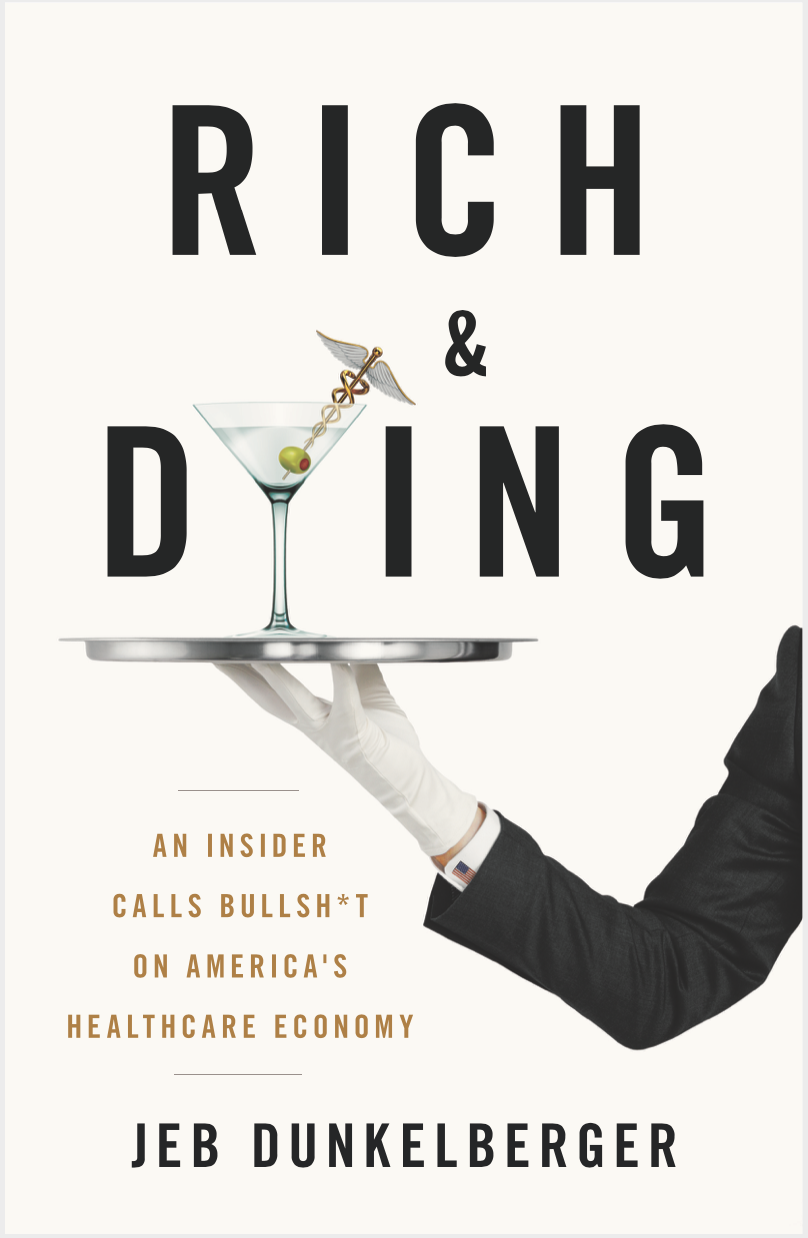Rich & Dying: An Insider Calls Bullsh*t on America’s Healthcare Economy
Written by Jeb Dunkelberger, published in 2021. Summary and review.
This was a read suggested by my boss. As a lifelong worker in the healthcare economy myself (healthcare IT – nothing actual care related) I did have a vested interest in learning more about this subject – given I talk with hospitals and health systems nearly every day.
Dunkelberger was a young buck hotshot who quickly rose to VP level at a major health insurance carrier before moving on to Silicon Valley health tech start ups and ultimately CEO at Sutter Health (a major California health system and payer). He peels back the onion on how things are done and why many good ideas fall short when attempting to correct our healthcare system. One that isn’t bad… but is also woefully bad.
He leads by stating that healthcare in America is perfect… if we define perfect as a function of creating jobs and driving the economy. It’s far from perfect when we think of healthcare as affordable or providing quality care. Many other countries do this much, much better. What gives?
My favorite insight from this book, and certainly something I’ve never once considered (though have been on the losing end of this since joining the professional workforce nearly 20 years ago), is that essentially 98% of the consumers choice (when it comes to healthcare) is pre-made. Meaning, me, you, essentially every regular American, has only 2% autonomy when it comes to making healthcare decisions.
It’s not a free market (he goes on to explain why it can’t be), but provides a great (and very simple) example to what he means. If a toddler is given the choice of an apple or a banana as a snack to eat by his parents. The toddler has a “choice”. But that “choice” is pre-made and set. The parents have already gone to the grocery store, and out of the (I don’t know thousands, millions?) of options available, the parents have decided that these are the 2 options worthy of their toddlers choice as a snack to eat. The exact same thing is done when it comes to health insurance. The payers have already created networks of physicians and hospitals they will support, those healthcare providers have determined which services are covered by said insurance (and at what rates). The employer has picked which broker to work with. That broker has X amount of payers they work with (and probably only provide a subset to the employer of options they can procure). So when HR presents you with your health insurance options, you probably have like 3 to choose from… all of which have had many, many decisions already baked in. This… is wild. And absolutely true. I’ve never thought about it that way, but it’s spot on.
He also cites how commercial payers (your Aetnas, Blue Crosses, Humanas, etc.) support the entire healthcare economy. Government programs/plans (Medicare, Medicaid and others) are loss leaders and need to be supported by higher paying commercial plans. Thus, we have started to see more and more high deductible health plans being presented to workers… as the cost gets shifted from the commercial plan (that pays more in reimbursement) to the employer and then to the employee. A model that can’t (or shouldn’t) continue. Not good for anyone.
Dunkelberger also goes on to talk about how healthcare has become highly political. The few in power make all the decisions. This isn’t new, but highly problematic when we consider they are professional politicians and not experienced healthcare professionals with actual insights into how things work (or could work). Lobbying further exacerbates this problem and keeps the areas of high profitability (which aren’t necessarily good for actual healthcare) as status quo.
Value Based Care, a novel concept, simply isn’t working. There are too many plans with too many variables for physicians to manage properly every little nuance. If we could implement a standard of VBC across payers, things could get better (or at least get simplified). This, in my opinion, is unlikely to happen. And even today, with a huge push for VBC, only 5-10% of reimbursement stems from VBC… the rest is old school Fee For Service – basically more services equals more money. Not better outcomes driving the dollar train.
Payers, who have the largest control in the market, aren’t really driving efficiency or new avenues for systems or processes. They hire more and more workers, without replacing archaic jobs or upskilling existing ones. More isn’t always the answer.
Perhaps not surprising, medical bills account for 60% of personal bankruptcy filings. With the average savings of US households at $12,000… it’s easy to see why. Especially when care can VERY QUICKLY surpass this amount.
Jeb makes the argument for universal healthcare vs. socialized medicine. The latter being everyone gets the same (not a good idea), where the former means everyone at least has access to a minimum standard of care. This, I like. Neither purely socialized medicine nor purely free market as viable options for US healthcare. Jeb explains more in the book about this, I will not 😊
He also talks about one, in my mind, highly viable option for improving our system with centralized credentialing. This, I believe, could quite easily be accomplished and would eliminate a truly tremendous amount of administrative burden that the US Healthcare Economy currently experiences.
Lastly, he also cites a… perhaps taboo… concept to help correct course. If 5% of the terminally ill patients in America (that is those that are, for lack of better phrasing, are guaranteed to die… no interventions will solve their issue – i.e. Stage 4 Colon Cancer) were listed as DNR (Do No Resuscitate) we could save $50B per year in healthcare costs. The last week of care for someone in this category can have exponentially higher medical bills. Obviously this is a highly individualized and personal decision… but the point is solid.
TLDR: A very quick read that quickly and successfully outlines how and why are system is broken while also providing a few areas of how to rebuild from the ground up our system of care. While personally I don’t see any of this actually happening (negative Nancy over here), I did enjoy how he portrays the problems and potential solutions. For anyone in the field, or interested. Would Recommend. 4/5 Stars.




